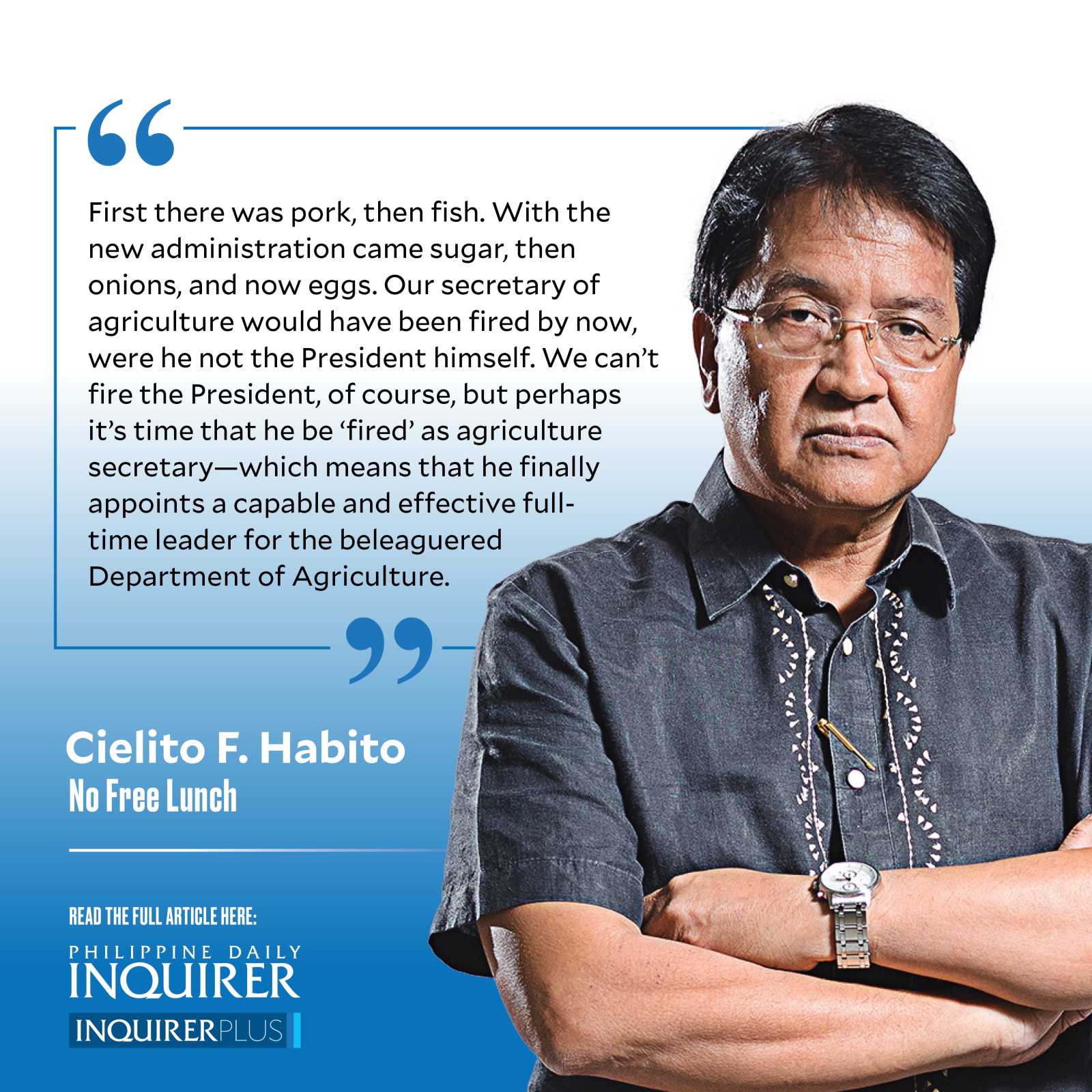A broken organization
First there was pork, then fish. With the new administration came sugar, then onions, and now eggs. Our secretary of agriculture would have been fired by now, were he not the President himself. Undersecretary Leo Sebastian, then the President’s supposed alter ego, had earlier been ignominiously fired—now belatedly absolved—for actually doing the right thing to stem surging sugar prices. We can’t fire the President, of course, but perhaps it’s time that he be “fired” as agriculture secretary—which means that he finally appoints a capable and effective full-time leader for the beleaguered Department of Agriculture (DA). It is, after all, so central now in the nation’s single biggest economic challenge: food price-driven inflation surging faster than in our close and comparable neighbors—implying that we can’t hide behind the excuse that global forces beyond our control are to blame.
In and out of the department, we hear that the DA is in a state of paralysis, with no one making critical decisions, for fear of “doing a Sebastian.” True or not, I‘ve known DA to be a fundamentally dysfunctional organization, and this is actually the single biggest obstacle to the invigoration of our languishing farm and fisheries sector. Don’t get me wrong; I do not mean to cast aspersions on the many men and women in the department who have done their work over the years with professionalism and integrity. For nearly four decades, I have witnessed and worked with them on and off, directly and indirectly. But I’ve come to be convinced that the organization itself is broken. And with some bad eggs who may be few in number but positioned to cause significant damage, the result has been a sector that has been a drag to the Philippine economy.
Article continues after this advertisementI must confess that I initially welcomed the President’s announcement that he will be the DA secretary. That’s because I now believe that only the President could get away with making the unpleasant and unpopular decisions long needed to fix the DA without fear of political backlash. At least one agriculture secretary had privately expressed frustration that “his hands were tied” because influential political appointees surrounded him, and he also couldn’t cross paths with influential legislators holding his budget hostage. Only a well-meaning, competent, and hands-on President would not be so hampered in fixing the DA to make it truly responsive to the needs of farmers, fishers, and consumers alike.
What exactly needs fixing? I’ve been in recent discussions on this as I’m directly involved in initiatives to improve the agriculture and fisheries extension system, i.e., the modes of delivery for improved technology, techniques, and practices to raise farmers’ and fishers’ productivity. This is in fact DA’s foremost challenge now, as our high food prices trace to low production and productivity, abetted by decades of excessive trade protection. Yet the department is not organized to do this crucial function well. Its leadership structure does not even reflect the prioritization of research and extension as a key responsibility. The former position of undersecretary for policy, planning, and research has been renamed to replace the last word with “regulation,” suggesting to my naughty mind that regulation is more important than productivity in the department’s thinking. They seem to be behind on the new thinking on “R4DE” (research for development and extension) highlighting the importance of integrating the three. More importantly, DA should be working through the provincial local government units (LGUs) as coordinators of field extension. But its structure, budget, and performance indicators do not enable an effective DA-LGU interface to make this mode of service delivery happen.
Much more needs fixing in the DA. Agriculture is far too important to be left to the DA alone, and all major stakeholders must take part in mapping the road ahead. We need a multisectoral Agriculture Commission—like the Education Commission that Congress has created (but yet to convene)—to take a long, hard look at the way forward for Philippine agriculture.
Article continues after this advertisementAnd the first milestone is the thorough reform and revamp of our broken DA.
cielito.habito@gmail.com

















